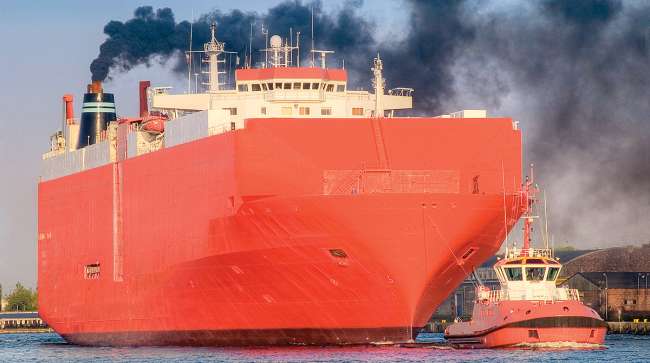Senior Reporter
Diesel Prices Remain Stable as IMO 2020 Mandate Set to Begin

[Stay on top of transportation news: Get TTNews in your inbox.]
Years of planning and preparation by the ocean shipping, oil and trucking industries are set to pay off as adequate supplies of diesel fuel are expected to be ready now that an International Maritime Organization mandate for the use of lower polluting fuel on ocean vessels is about to take effect.
“I think we have come a long way, especially in the last two to three years, getting ready for this transition,” independent oil industry analyst and consultant John Hofmeister told Transport Topics regarding the Jan. 1, 2020, adoption of an IMO directive that requires ocean vessels — which use as much as 4 million barrels of oil a day — to switch to low-sulfur diesel or other fuels.
The sulfur content of ships’ fuel must now meet a 0.5% or 5,000 parts per million limit — far below the current 3.5% or 35,000 ppm limit. While ships may continue burning heavier but less expensive marine or “bunker” fuel, as it’s known, they must be equipped with “scrubbers” that curtail the amount of pollution produced.
IMO 2020 - cleaner shipping for cleaner air. https://t.co/w3PvQnATUM Français: https://t.co/4XNdd73mfp Español: https://t.co/b60ZY9EKaG #IMO2020 #Sulphur2020 #BreatheLife pic.twitter.com/ysP2XQAk5a — IMO (@IMOHQ) December 18, 2019
Thanks to the work done in advance of the mandate, that may not be necessary, said Hofmeister, a former president of Shell Oil.
“The oil industry has worked hard, and they have prepositioned diesel around the world to make it available where it had not previously been available,” he said. “So when shippers need diesel, it should be available, just about everywhere.”
In fact, several nations — including Japan and China — said refineries in those countries are producing more low-sulfur diesel to meet the expected increase in demand.
Some in the trucking industry have feared that increased demand from the ocean shipping industry would pressure diesel supplies for trucks. However, Glen Kedzie, vice president of energy and environment affairs at American Trucking Associations, told TT the issue has barely registered with trucking leaders the last several months.
“It’s been very quiet. I have not heard much about this lately,” he said.
The IMO mandate comes after a year when diesel prices remained stable. The U.S. average retail price of diesel dipped 0.5 cent to $3.041 a gallon, the Department of Energy reported Dec. 23, right around where it lingered for most of 2019.
Robust U.S. refining capacity is another positive factor. According to the Institute for Energy Research, U.S. daily crude production has increased from 7.5 million barrels in 2013-2014 to more than 12 million barrels today, due largely to hydraulic fracturing and horizontal drilling.
Also, the American Petroleum Institute says U.S. refining capacity has increased by nearly 7% since 2010, while throughput — the amount of petroleum passing through refineries — has increased 11.7% in the last nine years.

Hofmeister
Despite the preparation Hofmeister expects there will be a period of transition and some ocean carriers that still won’t be ready.
“I don’t think you’re going to see 100% compliance to start with,” he said. “I think there are going to be a number of shipping companies that just put off making preparations on the basis that they’re only going to be compliant when they get caught. Some folks around the world operate that way, and they’ll take their chances, and they’ll take the fines.”
But he noted that shippers in this category won’t be operating in high-enforcement areas with well-established rules and regulations.
“The ports of Europe, North America, Japan — people had better not show up with bunker fuel. If they do, they’re going to get nabbed pretty quickly,” he said. “But ports around Southeast Asia, India, Africa, South America, I don’t think they’re going to be as strict or demanding on shippers initially. But, eventually I think they will.”
Want more news? Listen to today's daily briefing:



